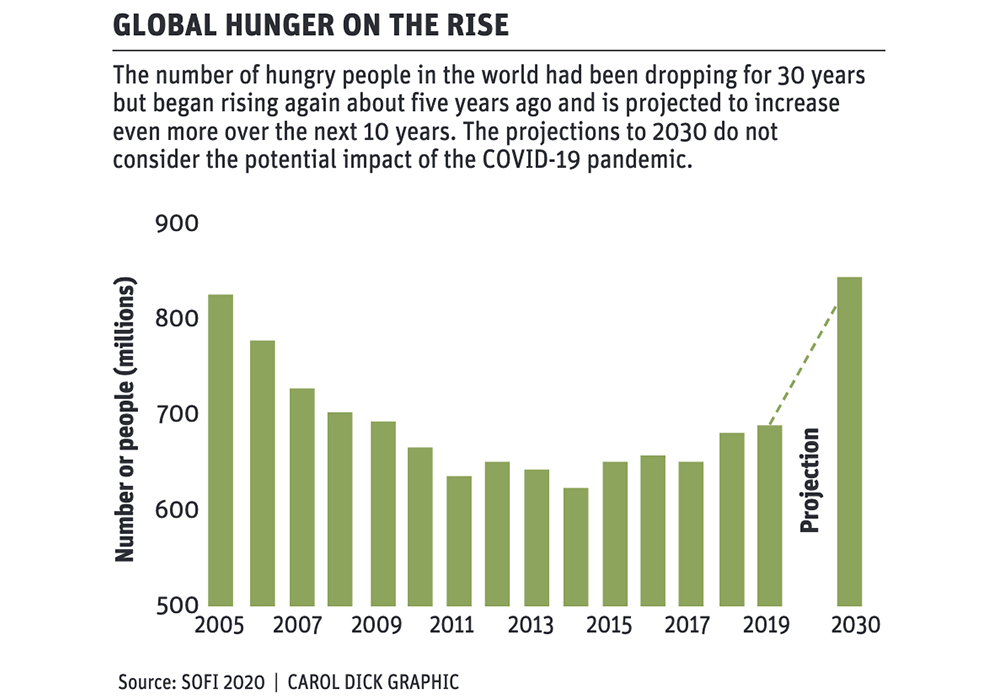Organization had feared the pandemic might reduce the number of growing projects this year, but that didn’t happen
The global pandemic has increased the number of hungry people in the world and the Canadian Foodgrains Bank is preparing to meet the challenge of helping to feed them.
Until 2014, there had been a 30-year decline in the number of hungry, but violent events in Yemen, South Sudan and Syria, among other countries, changed that direction. Over 690 million people are now in situations of chronic hunger and another 200 may join their ranks because of the pandemic, according to World Food Program projections.
As well, changing weather patterns are making it more difficult for people to live off the land, said outgoing foodgrains bank executive director Jim Cornelius, which reduces progress toward food self-sufficiency.
Read Also

Farming Smarter receives financial boost from Alberta government for potato research
Farming Smarter near Lethbridge got a boost to its research equipment, thanks to the Alberta government’s increase in funding for research associations.
Canadian farmers continue to do their part in fundraising. They donated money from more than 200 growing projects across the country in 2020 despite pandemic challenges.
“I know when COVID hit, we didn’t know what the response of Canadians was going to be to hunger around the world. And this was just at a time when growing projects were about to seed and get crops in the ground,” Cornelius said.
“I have to admit at the time it would not have surprised me in some sense, or I would have understood, is a better way of putting it, if people had said, ‘well, we’re going to take a year off because we’ve got urgent issues to deal with here at home’ … but that didn’t happen.
“Almost every project went ahead and put a crop in the ground and figured out ways to do it and our support has remained strong.”
As the pandemic continues, however, he said continued engagement in fundraising will be a major challenge.
Cornelius has retired as executive director, a post he had held since 1997. He will remain in a consulting role to his replacement, Andy Harrington.
Among immediate tasks for the two men is to negotiate renewal of the Global Affairs Canada grant, which in the past has matched CFB donations four to one. The federal agency provided $2.3 million early in the pandemic, which enabled the foodgrains bank to undertake 17 projects, said Harrington.
“We’re actually talking with them at the moment for a much larger sum that will be designated towards COVID relief efforts.”
The new executive director said the foodgrains bank has overcome numerous challenges already in delivering aid where needed, but he expects 2021 to present more issues.
“”Unless we put some of the precautions in place and we see a vaccine come out, we’re going to be dealing with this for a long time on the ground,” he said.
“And it’s not so much the impact of the disease that we’re dealing with.… It’s the impact of the breakdown of the supply chains caused by that disease. So we’re working as fast as we can and as carefully as we can, in order to create projects with our members that address those impacts.”
As he reflected on the history of the foodgrains bank, Cornelius said its efforts to ease world hunger are analogous with a relay race. Others have run the first legs of the race, beginning in 1974 with the early work of the Mennonite Central Committee.
“For more than three decades, food production continued to increase. The proportion of the world’s population experiencing hungry dramatically declined and the actual number of hungry people declined despite a rapidly increasing population,” he said.
Farming innovation, research, improved infrastructure, improved economies, better food crisis monitoring and expanded government programs to support the poor have all played a role.
Now there are questions about COVID-19 being a temporary problem or an accelerator that will see worsening hunger, said Cornelius.
“Further progress in reducing hunger or a reversal of this progress is not inevitable either way. It depends on what is done by many different sectors of society, including groups like Canadian Foodgrains Bank, our supporters, our member churches and partners around the world.
“So the race that we’re running is not over, nor is the sort of end … nearly in sight.”


















